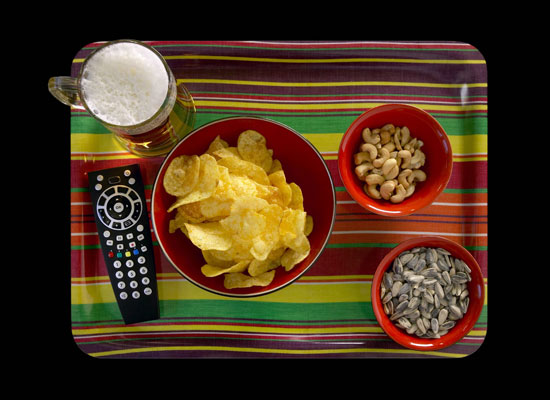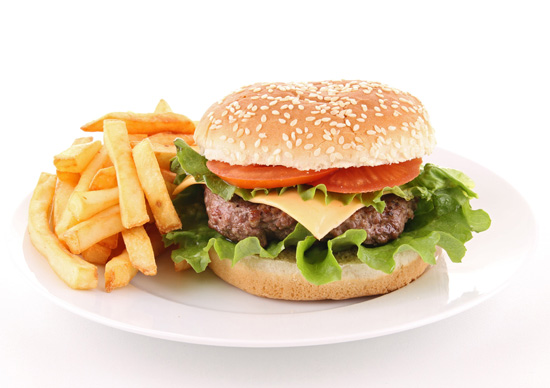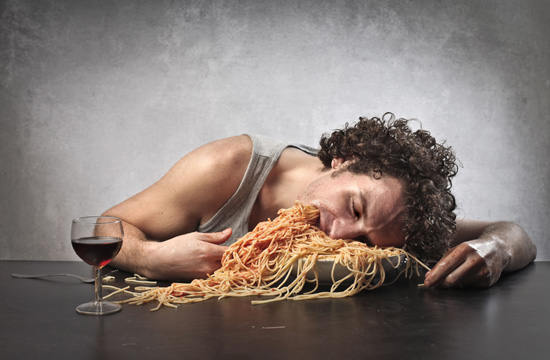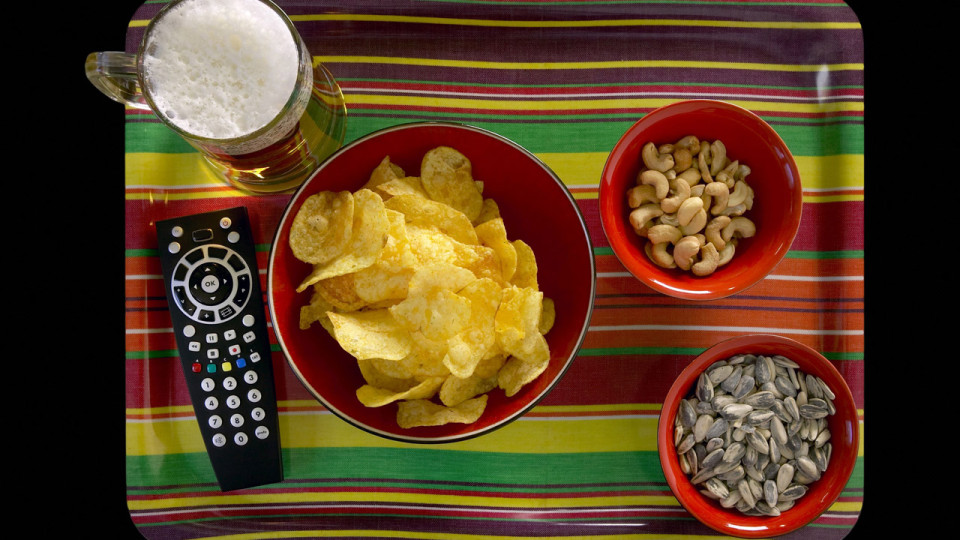Each year, millions of people go on a diet. According to research conducted by Julie Moynihan and Maggie Villiger, most of these dieters will lose a few kilograms, but over 8 in 10 will ultimately fail to keep the weight off. The reason why most dieters fail can be pinpointed to their eating habits at home. Seemingly innocent habits such as eating in front of the television or eating too late in the day can sabotage any diet, as well as hinder running performance.
Eating in Front of the Television
Most people eat in front of the television on occasion. However distracted eating, such as eating in front of the television, is not a good idea when dieting. According to an article published in the American Journal of Clinical Nutrition, eating in front of the television can cause people to ignore cues that tell them when they are full. This lack of cues can lead people, especially children, to overeat.

Eating in front of the television is especially a problem if the dieter is eating out of a bag instead of eating a controlled portion from a bowl or plate. Eating from a bag can lead to overeating when in front of the television because the person is not paying attention to how much food they are consuming. To avoid these problems, refrain from eating in front of the television and eat measured portions of food.
Going Out to Eat Too Often

Going out to eat is fun on occasion, but many dieters go out to eat too frequently. According to Gather.com, the majority of family dinners consist of take-out, fast food, and meals at restaurants. Lunches can be even worse, as busy workers purchase quick meals from drive-throughs instead of taking the time to pack a healthy lunch. When going out to eat or getting take-out becomes the norm rather than the occasional treat, people tend to gain weight. This is because restaurants rarely offer healthy choices that parallel what you would make at home. Even their “healthy” salads or other offerings often contain more oil, fats, and calories than a similar meal prepared at home.
In addition, restaurant portion sizes are usually much larger than a portion that a person prepares for him or herself. To avoid sabotaging the diet with restaurant meals, limit going out to eat to once a week or less.
Making Dinner the Biggest Meal
Many families make dinner their main meal of the day. According to an article by Nanci Hellmich, dieters who eat earlier and eat lighter meals instead of choosing a larger, later main meal, lose more weight. This is because those who eat smaller meals more frequently lower their sensitivity to insulin, which is not only a risk factor for type II diabetes, but also leads to overeating, poor food choices, and weight gain.
Eating Near Bedtime
Although eating too late and infrequently is a problem, eating late at night or near bedtime is the worst strategy of all. According to Tamara Cohen, columnist for The Daily Mail, calories consumed late at night are more likely to cause weight gain because the person does not have the opportunity to burn these calories through exercise or even through their normal daily activities. In addition, metabolism rises and falls according to an internal schedule, or “body clock.”

During the day, a person’s metabolism is at its highest and the muscles are working at peak efficiency, allowing the calories consumed to be burned more effectively. At night, the body is in a more relaxed state and calories are burned more slowly, allowing weight gain to occur. The best strategy to avoid this nighttime weight gain is to avoid snacking after dinner.
Eating Family Style
Experts agree that a family dinner eaten at the dining room table is the best strategy. According to Web MD, family dinners reduce weight gain and increase emotional well-being for all members of the family. However, how the food is served is just as important as what food is served. Many families serve food “family style,” with the serving dishes piled on the table. The large serving bowls and platters not only encourages larger than necessary portions, but leaving the serving dishes on the table encourages diners to take seconds when they are already full.
To prevent this problem, parents should pre-portion the plates according to the nutritional needs of each family member, and leave the serving dishes out of sight.
Placing Salt on the Table

Similar to leaving serving dishes on the table, placing salt on the table can sabotage a diet. According to an article on NPR.org, Dr. David Kessler states that salt is one of the culprits in the obesity epidemic. Salt not only leads to water retention, high blood pressure, and other health ills, but it also can make food more palatable, increasing the chances that the diner will overeat. To remedy this problem, keep the salt off the table. Once the dieter gets used to tasting food as it is, without the salt or with a small amount of salt, they are less likely to suffer adverse health risks or to overeat.
Where to Find Diet Help
Dieters who are struggling to lose weight may benefit from seeing a physician or nutritionist. These health professionals can help the dieter evaluate his or her eating habits and eliminate problems such as these, as well as help them to select healthier foods. These healthier foods will not only help the dieter lose weight and keep it off, but also improve their performance in marathons and other races.





